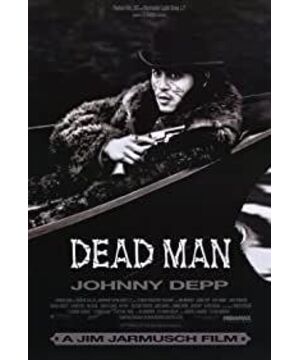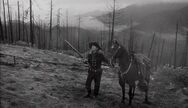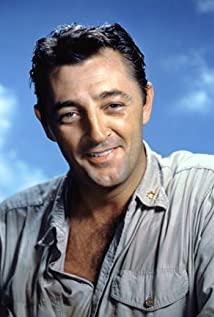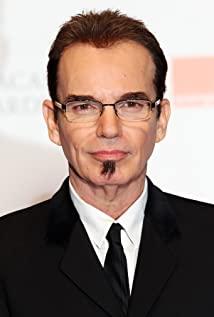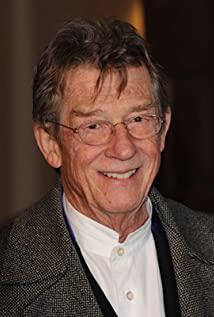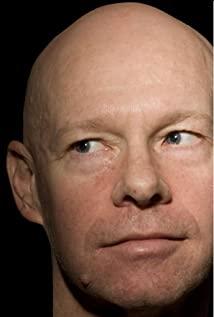At the beginning, the boiler worker on the train went straight to Black and sat down, and said to him, "Looking out the window, does it remind you of the feeling of being on a boat? That night, in the dead of night, you were lying in bed and looking at the sky, and the water was flowing beside you. Once, like those scenery, you will wonder: Why are these scenery moving, but the boat is still?" The boiler worker threw this sentence to Blake without warning, like a prophet, to Blake’s past and The upcoming destiny is clear.
In reality, Blake's parents died, his fiancée abandoned him, and desperately desperate. He traveled to the far west to seek a living with only a piece of official document. Black is easily reminiscent of Kraft's characters, lonely, timid and weak, never thinking, as if thinking is superfluous. When he came to the factory, he was ridiculed by the employees and expelled with a gun from the boss. He did not resist and left in a desperate manner. When the factory owner's son shot the flower girl and himself, Black shot him back and hurried to escape. Since then, the body began to wander, and the soul declared its return.
Nobody is also a wanderer, and his appearance is to lead the way for Black's soul. Nobody has a contemptuous and insightful look, and some weird verses often pop up on his mouth, "You killed the white man who killed you"; "Every night, every morning, some people are destined to be miserable. Every night, Every morning, some people are destined to be happy. Some people are destined to be happy, and some are destined to endure the endless night." These make Black feel puzzled, and the audience is the same. Nobody only throws out his own words and never explains. When Nobody determined that Blake was the poet William Blake, he determined his mission-to bring Blake to the confluence of sea and sky, that is the home of his soul.
"Exploring dreams is a great blessing. To do this, you must experience a moment of no water and no food." Since then, Black's physical energy has become weaker, but his soul has become stronger. Use guns to replace your own lips and tongues, and write poems with your own blood. Blake killed the twin policemen and shop priest, and gradually became the real poet William Blake.
Finally, Blake, dressed in solemn costume, lay on Nobody's boat made of cedar, and followed the water to the sea. Where do you come from? Where do you go back. Nobody said "This world will never miss you anymore".
In addition, the reason why this movie is difficult to understand is because Jamusch uses a lot of metaphors. For example, "tobacco" is a metaphor throughout the film. "Do you have a cigarette?" In the film, the characters Nobody, flower girl, killer, factory owner, passerby, and priest (except Blake) all regard smoke as As a treasure, it can be seen that "smoke" plays a very important role in understanding this movie. "Smoke" symbolizes a kind of exuberant spiritual vitality in that primitive western land, which can bring extraordinary hallucinations to the soul. Nobody asked Black more than once in the film to make sure there was no smoke. Black couldn't help but become very annoyed and became even more puzzled. Another example is the appearance of the twin policemen when they died-one is like Jesus surrounded by a halo, and the other is not. It proves that "some people are destined to be happy, and some are destined to endure the endless night." Black lay in the grass holding the dead deer, and the deer was shot in the neck. There is also the contrast between whites and Indians: whites are selfish, stupid, savage and cruel, plundering and destroying Indians. The Indians live in peace and peace, and love life. Regarding the connotation of metaphor, the benevolent see benevolence, and the wise see wisdom. When Jia Muxu himself commented on the film, he said: "The film seems to be discussing an illusion, an illusion that drifts on the edge."
Of course, there are many fascinating features of this film: the distinctive black and white pictures, and the soothing desolation. The guitar playing, the character design with outstanding personality. Of course, I have to pay attention to its unique rhythm: a black screen is added between the transitions of the two lenses to cut off the fluency between them. This seemingly low-level approach gives the movie itself a unique sense of rhythm and fullness. Diaphragm echoes the awkward relationship between the characters, and cleverly conveys the themes of "loneliness" and "distance".
This film is more poetic and unspeakable compared to other films of Jia Muxu.
View more about Dead Man reviews


